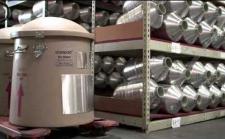Inside the Hidden Global Supply Chain for Frozen Sperm, Eggs, and Embryos
By Sarah Zhang,
WIRED
| 04. 25. 2016
Untitled Document
In a world with porous borders and wildly divergent surrogacy laws, making a baby can be a global affair: The eggs might come from a woman in South Africa, the sperm from a man in Canada, and the surrogate herself might be in Cambodia. What connects them, literally, is a cold chain.
Typical cold chains—made up of refrigerated trucks and shipping containers—bring us perfectly preserved bananas from Central America, seafood from Asia, and vaccines from Europe. But it takes a specialized cold chain to transport finicky eggs, sperm, and embryos across the world for surrogacy via in vitro fertilization. To expectant parents, that material is more precious any other possible cargo. And they’re willing to pay. A lot.
Continue reading on WIRED...
Image via Cyroport
Related Articles
By Katherine Long, Ben Foldy, and Lingling Wei, The Wall Street Journal | 12.13.2025
Inside a closed Los Angeles courtroom, something wasn’t right.
Clerks working for family court Judge Amy Pellman were reviewing routine surrogacy petitions when they spotted an unusual pattern: the same name, again and again.
A Chinese billionaire was seeking parental...
By Sarah A. Topol, The New York Times Magazine | 12.14.2025
The women in House 3 rarely had a chance to speak to the women in House 5, but when they did, the things they heard scared them. They didn’t actually know where House 5 was, only that it was huge...
By Sarah Kliff, The New York Times | 12.10.2025
Micah Nerio had known since his early 30s that he wanted to be a father, even if he did not have a partner. He spent a decade saving up to pursue surrogacy, an expensive process where he would create embryos...
By Carter Sherman, The Guardian | 12.08.2025
A huge defense policy bill, revealed by US lawmakers on Sunday, does not include a provision that would have provided broad healthcare coverage for in vitro fertilization (IVF) for active-duty members of the military, despite Donald Trump’s pledge...




